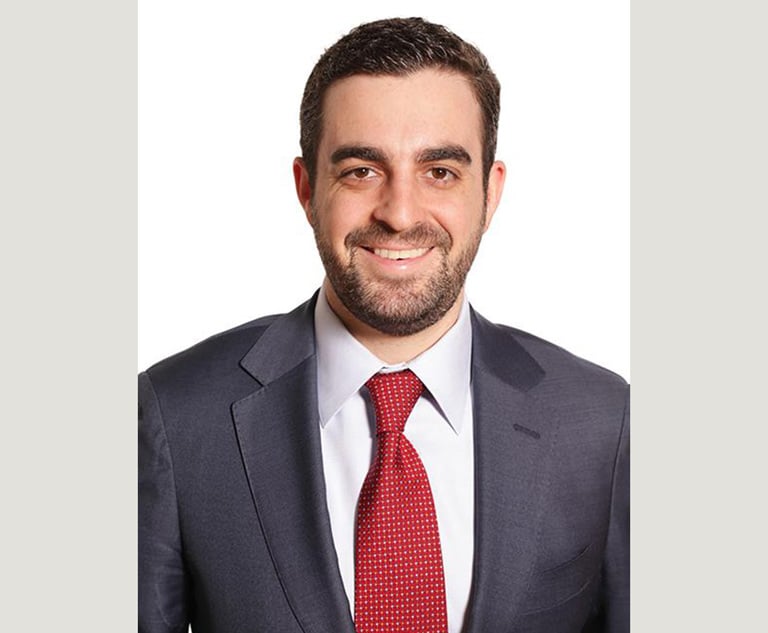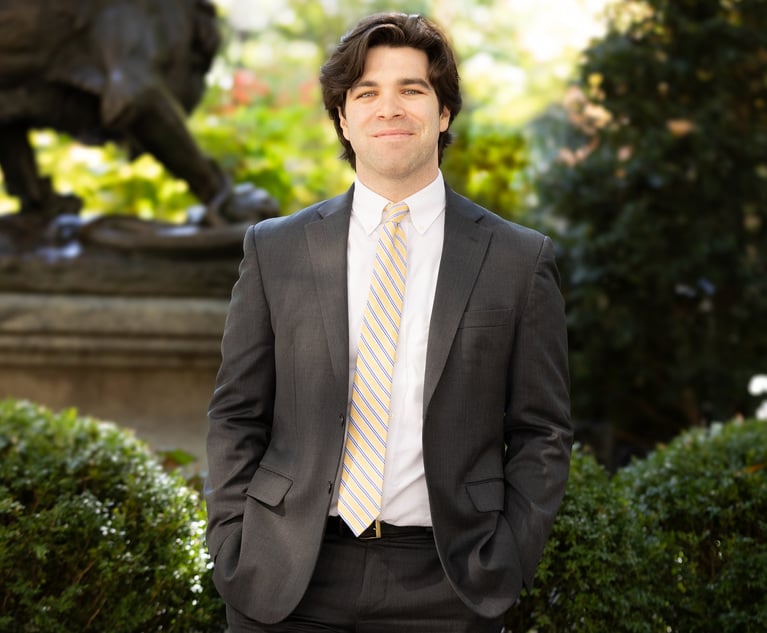 Former Penn State president Graham Spanier. Photo: Shutterstock.com
Former Penn State president Graham Spanier. Photo: Shutterstock.comSpanier Conviction Tossed by Federal Court Over Jerry Sandusky's Child Molestation
A federal judge has overturned former Penn State president Graham Spanier's child endangerment conviction.
May 01, 2019 at 10:11 AM
6 minute read
A federal judge has overturned former Penn State president Graham Spanier's child endangerment conviction.
On Tuesday, U.S. Magistrate Judge Karoline Mehalchick of the Middle District of Pennsylvania vacated Spanier's conviction, finding that it was based on a statute that did not go into effect until six years after the conduct for which he was convicted occurred. The 42-page opinion directed prosecutors to retry Spanier within 90 days.
“Spanier submits that this retroactive application is unreasonable and far more extensive than anyone in 2001 would have been able to reasonably foresee. The court agrees,” Mehalchick said.
Pennsylvania Attorney General Josh Shapiro has already announced his office plans to appeal the ruling. In a statement issued Wednesday, he said Spanier had been personally advised that children were being abused on school property, and that evidence showed he “chose not to help the children—but instead to cover up the abuse, despite being well aware of his responsibility as a supervisor.”
“In a last-minute and highly unusual decision yesterday evening, a federal magistrate set Spanier free just before he was finally about to begin serving his deserved sentence. Federal courts have very limited power to act in state criminal proceedings, and this ruling plainly exceeded that power,” Shapiro said. “As the Pennsylvania Supreme Court has made crystal clear, Spanier's conduct was illegal. The Office of Attorney General will quickly appeal this ruling to hold him accountable for his conduct covering up child sexual abuse. No one is above the law.”
Spanier's attorneys, Samuel Silver and Bruce Merenstein of Schnader Harrison Segal & Lewis, strongly denied Shapiro's assertion in a statement released Wednesday afternoon, saying they were “dismayed” that the office “would blatantly and prejudicially misrepresent facts.”
“Contrary to Attorney General Shapiro's statement, there is no evidence that Graham Spanier was personally advised that children were being sexually abused. And Attorney General Shapiro knows that the Pennsylvania Supreme Court made nothing 'crystal clear' about Dr. Spanier's conduct, as it did not hear this case on the merits at any time,” the statement said. “We will continue to defend Dr. Spanier against this overzealous and unlawful prosecution. And we will continue to do so in the courts, where the dispute belongs—and not through hyperbolic statements like that of the attorney general.”
Spanier was convicted by a Dauphin County jury in March 2017 on a single count of endangering the welfare of a child.
Prosecutors had contended during trial that Spanier and his co-defendants—former athletic director Tim Curley and ex-senior vice president Gary Schultz—decided against reporting convicted serial child molester Jerry Sandusky to authorities in 2001 after an assistant coach reported that he encountered Sandusky engaging in sexual contact with a boy in a Penn State shower. The three made that decision, prosecutors contended, despite knowing that Sandusky had been investigated in 1998 for similar activity.
Spanier was sentenced to four to-12 months' incarceration, which was set to begin Wednesday.
Spanier had appealed the conviction through the state appellate system, but both the Pennsylvania Superior and Supreme courts upheld the jury's verdict.
In June, Superior Court Judge Victor Stabile, who wrote the majority's opinion, cited the Pennsylvania Supreme Court's 2015 decision involving Monsignor William Lynn, which held that a conviction for endangering the welfare of a child does not require actual supervision of the child.
“To hold that appellant was not supervising a child's welfare when he oversaw PSU's response to the Sandusky allegations, or to hold that he owed no duty of care in his exercise of that supervisory authority, would plainly not effectuate the purpose of sheltering children from harm,” Stabile said. “Similarly, we cannot believe that the common sense of the community would not find that appellant owed no duty of care in discharging his supervisory role.”
The Pennsylvania Supreme Court upheld that ruling in a one-page per curiam order in February.
Spanier appealed his conviction to the federal court through a writ of habeas corpus, contending that the conviction went against the ex post facto and due process clauses of the constitution. The appeal focused on the argument that he was improperly convicted on a 2007 version of the child endangerment law, which had expanded the application of the law beyond those who directly oversee the welfare of children, and had said the law should also apply to anyone who oversees the parent, guardian or supervisor who is directly responsible for the child.
The ex post facto argument had first raised been raised by Lynn, who was the first Catholic Church administrative official convicted of endangering the welfare of children abused by other priests. Lynn was found guilty for child endangerment in 2012, but, on appeal, he argued the child endangerment law was being unconstitutionally and retroactively applied to his case, since the law was not amended to include supervisors of supervisors until 2007—long after the conduct for which he was convicted took place.
The Philadelphia District Attorney's Office, which prosecuted Lynn, had argued the 2007 amendment was merely a clarification of what had always been the law's intent, and the Supreme Court agreed in 2015, finding there was “no statutory requirement of direct supervision of children.”
“Under the facts presented at trial, [Lynn] was a person supervising the welfare of many children because, as a high-ranking official in the Archdiocese of Philadelphia, he was specifically responsible for protecting children from sexually abusive priests,” Justice Max Baer had said for the majority.
Mehalchick noted in her ruling that Spanier was not challenging the Supreme Court's interpretation of Lynn, but rather arguing that he was innocent under the 1995 version of the child endangerment law, which was the law in effect when the underlying conduct occurred.
Although Mehalchick said that her ruling did not disturb the Supreme Court's Lynn decision, she said Pennsylvania case law before that ruling generally held that a person needed to be involved in the welfare of the child to have the law applied to them, and that the Lynn decision constituted an “unforeseeable interpretation of the 1995 statute.” Citing the 1964 case Bouie v. City of Columbia, which said that an “unforeseeable judicial enlargement of a criminal statute, applied retroactively, violates the federal due process right,” Mehalchick ultimately determined Spanier's conviction needed to be vacated.
This content has been archived. It is available through our partners, LexisNexis® and Bloomberg Law.
To view this content, please continue to their sites.
Not a Lexis Subscriber?
Subscribe Now
Not a Bloomberg Law Subscriber?
Subscribe Now
NOT FOR REPRINT
© 2024 ALM Global, LLC, All Rights Reserved. Request academic re-use from www.copyright.com. All other uses, submit a request to [email protected]. For more information visit Asset & Logo Licensing.
You Might Like
View All
Philadelphia Bar Association Executive Director Announces Retirement
3 minute read
Phila. Jury Hits Sig Sauer With $11M Verdict Over Alleged Gun Defect
3 minute read
Phila. Attorney Hit With 5-Year Suspension for Mismanaging Firm and Mishandling Cases
4 minute read
Trending Stories
- 1Gibson Dunn Sued By Crypto Client After Lateral Hire Causes Conflict of Interest
- 2Trump's Solicitor General Expected to 'Flip' Prelogar's Positions at Supreme Court
- 3Pharmacy Lawyers See Promise in NY Regulator's Curbs on PBM Industry
- 4Outgoing USPTO Director Kathi Vidal: ‘We All Want the Country to Be in a Better Place’
- 5Supreme Court Will Review Constitutionality Of FCC's Universal Service Fund
Who Got The Work
Michael G. Bongiorno, Andrew Scott Dulberg and Elizabeth E. Driscoll from Wilmer Cutler Pickering Hale and Dorr have stepped in to represent Symbotic Inc., an A.I.-enabled technology platform that focuses on increasing supply chain efficiency, and other defendants in a pending shareholder derivative lawsuit. The case, filed Oct. 2 in Massachusetts District Court by the Brown Law Firm on behalf of Stephen Austen, accuses certain officers and directors of misleading investors in regard to Symbotic's potential for margin growth by failing to disclose that the company was not equipped to timely deploy its systems or manage expenses through project delays. The case, assigned to U.S. District Judge Nathaniel M. Gorton, is 1:24-cv-12522, Austen v. Cohen et al.
Who Got The Work
Edmund Polubinski and Marie Killmond of Davis Polk & Wardwell have entered appearances for data platform software development company MongoDB and other defendants in a pending shareholder derivative lawsuit. The action, filed Oct. 7 in New York Southern District Court by the Brown Law Firm, accuses the company's directors and/or officers of falsely expressing confidence in the company’s restructuring of its sales incentive plan and downplaying the severity of decreases in its upfront commitments. The case is 1:24-cv-07594, Roy v. Ittycheria et al.
Who Got The Work
Amy O. Bruchs and Kurt F. Ellison of Michael Best & Friedrich have entered appearances for Epic Systems Corp. in a pending employment discrimination lawsuit. The suit was filed Sept. 7 in Wisconsin Western District Court by Levine Eisberner LLC and Siri & Glimstad on behalf of a project manager who claims that he was wrongfully terminated after applying for a religious exemption to the defendant's COVID-19 vaccine mandate. The case, assigned to U.S. Magistrate Judge Anita Marie Boor, is 3:24-cv-00630, Secker, Nathan v. Epic Systems Corporation.
Who Got The Work
David X. Sullivan, Thomas J. Finn and Gregory A. Hall from McCarter & English have entered appearances for Sunrun Installation Services in a pending civil rights lawsuit. The complaint was filed Sept. 4 in Connecticut District Court by attorney Robert M. Berke on behalf of former employee George Edward Steins, who was arrested and charged with employing an unregistered home improvement salesperson. The complaint alleges that had Sunrun informed the Connecticut Department of Consumer Protection that the plaintiff's employment had ended in 2017 and that he no longer held Sunrun's home improvement contractor license, he would not have been hit with charges, which were dismissed in May 2024. The case, assigned to U.S. District Judge Jeffrey A. Meyer, is 3:24-cv-01423, Steins v. Sunrun, Inc. et al.
Who Got The Work
Greenberg Traurig shareholder Joshua L. Raskin has entered an appearance for boohoo.com UK Ltd. in a pending patent infringement lawsuit. The suit, filed Sept. 3 in Texas Eastern District Court by Rozier Hardt McDonough on behalf of Alto Dynamics, asserts five patents related to an online shopping platform. The case, assigned to U.S. District Judge Rodney Gilstrap, is 2:24-cv-00719, Alto Dynamics, LLC v. boohoo.com UK Limited.
Featured Firms
Law Offices of Gary Martin Hays & Associates, P.C.
(470) 294-1674
Law Offices of Mark E. Salomone
(857) 444-6468
Smith & Hassler
(713) 739-1250





